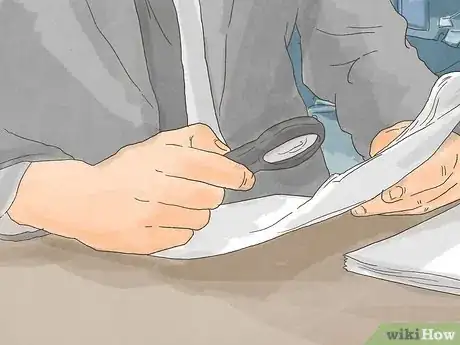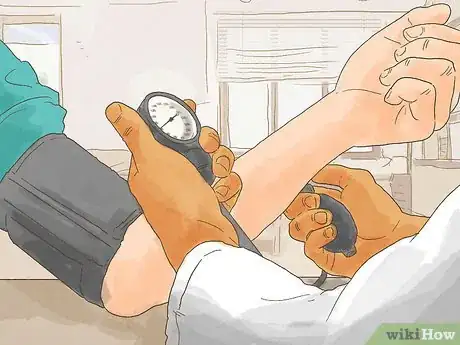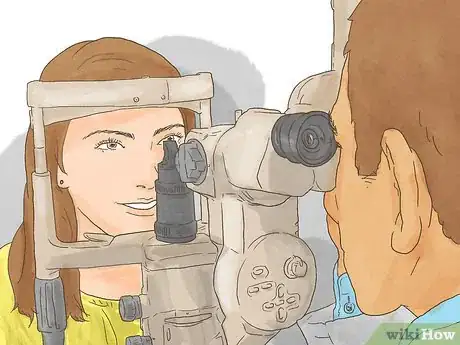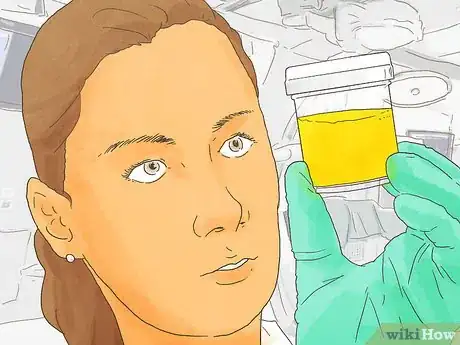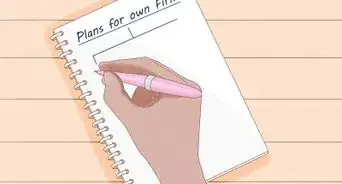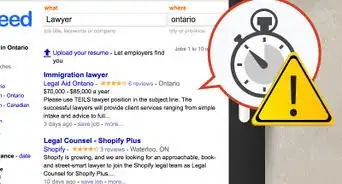This article was co-authored by wikiHow Staff. Our trained team of editors and researchers validate articles for accuracy and comprehensiveness. wikiHow's Content Management Team carefully monitors the work from our editorial staff to ensure that each article is backed by trusted research and meets our high quality standards.
There are 9 references cited in this article, which can be found at the bottom of the page.
wikiHow marks an article as reader-approved once it receives enough positive feedback. In this case, 100% of readers who voted found the article helpful, earning it our reader-approved status.
This article has been viewed 185,191 times.
Learn more...
NYPD has the biggest police department in the United States and with that a lot of opportunities await those qualified for the job. These opportunities include becoming specialists in Aviation, Highway Patrol, Emergency Services, Crime Scene Analysts, Criminal Investigations, Drug Enforcement and more.[1] However, the application process is extensive and the physical and mental requirements can be a challenge for some candidates. Make sure you understand what is required and what you will need to do before initiating the application process.
Steps
Preparing your Application
-
1Make sure you meet qualifications. You must also be a U.S. citizen and claim residence within the five boroughs of New York City or the surrounding counties of Nassau, Suffolk, Westchester, Rockland, Putnam, or Orange.[2]
- Most police departments outside New York City require recruits to be at least 20 years old to become a police officer, and at least 19 years old to take the written test.
- Some police departments including the New York City Police Department (NYPD) require recruits to be at least 21 years old to become a police officer, but at least 17 and a half years old to take the written test.
- New York State allows police departments to recruit new officers who met the minimum age requirement until they turn 35 years old to which they can no longer apply. Veterans with an honorable discharge may apply until the age of 37.
-
2Bring proof of education. You will need to be able to document either 60 college credits received with a Grade Point Average of at least 2.0 or 2 years of military service.[3]
- You will need an official transcript from your college.
Advertisement -
3Submit to a background check. You will need to authorize the NYPD to conduct a background check. Any unexpunged criminal activity can disqualify you.
- Any felony conviction automatically disqualifies you as well as any conviction for domestic violence-related charges, including misdemeanors.
- Dishonorable discharge from the military will also disqualify you.
-
4Contact the Applicant Processing Division with questions. Specifically, contact their Candidate Relations Section.
- Their phone number is (718) 972-2503. You can call anytime between 7:00am and 7:00pm, 7-days a week.
- You can also email them at APD@NYPD.org.
Passing your Exams
-
1Complete the memory booklet. You will have 10 minutes to carefully study the details of a photo. You will not be able to take notes. Then the photo will be taken away and will be asked questions requiring you to describe minor details of the photo.[4]
-
2Demonstrate spatial orientation. You will be presented a map and asked to pick the route that contains the shortest distance between two points.
-
3Demonstrate written comprehension. You will be asked to read and understand written passages and then answer relevant questions.
- You will also have to complete written sentences using the correct word or phrase. The focus will be on your grammar and appropriate use of language.
-
4Demonstrate inductive and deductive reasoning. You will be presented various sets of information and asked to draw conclusions and justify them.[5]
- Deductive questions will involve processing and eliminating certain forms of information to determine which facts should inform your conclusion.
- Inductive reasoning questions will begin with a conclusion and ask you to assess its validity by reviewing the facts that lead to it.
- You can purchase exam prep kits from a variety of services.Many of these will include samples for all of the relevant sections.
-
5Take the Job Standard Test. This test consists of a 6-part obstacle course that simulates basic physical activities you will need to perform on the job. You will need to complete the test in under 4 minutes and 28 seconds.[6]
- The 6 stations are a barrier surmount, a physical restraint simulation, stair climbing, running in pursuit, trigger pull and victim rescue.
- If you fail your JST, you will need to wait 4 months before you can take it again.
-
6Attend the Academy. You will need to attend 26 weeks of academy training sessions, including 1,095 hours of training with certified staff.
- Your academy training will include a wide range of activities including shooting, use of non-lethal force, car and foot pursuit, investigative procedure, conflict resolution and
- You will also be subject to in-service training after you graduate from the Academy. Some of this training will be mandatory and some will be optional but required for advancement and promotion.
Getting Medical Clearance
-
1Take a general exam. Your height, weight, blood pressure, cholesterol, hearing and dental health will be assessed during a general medical exam.
-
2Take a vision test. You will need a vision score of 20/100 for uncorrected vision or 20/20 for corrected vision.
- You will also be tested for color blindness. If you are color blind, you will be disqualified.
-
3Take a drug test. If any illicit drug shows up on your screening you will be disqualified from service.
- Even if you have legal authorization to use medical marijuana or come from a state where marijuana use is legal, you will still be disqualified if it shows up in your screening.[7]
- Make sure you provide certified medical prescriptions. This is especially important if you take an amphetamine-based prescription like Ritalin or a prescription opiate like Oxycodone.[8]
Acing your Interviews
-
1Meet with a character investigator. Every candidate undergoes a mandatory character investigation. An investigator will contact you to request any necessary documents and will meet with you for a formal interview.
- The character investigation will cover things not necessarily included on your criminal background check such as a history of civil legal actions or a poor credit score. This will not necessarily disqualify you but could if the investigator determines that it is detrimental to your ability to perform your job.
-
2Take oral psychological exam. The oral psychological exam will assess your ability to handle stressful situations.
- The examiner will likely try to make you angry, ask you a large number of repetitive questions and ask for split-second reactions to stressful scenarios. The point is to see if you can remain calm and consistent.
- The exact content and procedure can vary greatly but will usually involve questions about your background and basic logic questions.
-
3Understand your salary and benefits. Once you pass the basic requirements, you will begin receiving pay during the training period. Unless you undergo specialty training and receive a specialist position, you will start on the standard salary and benefits package for recruits.
- While training, your salary will be $44,744, which may go up to $46,288 after six months. After 18 months, the salary may go up to $48,173, up to $53,819 after 30 months, up to $58,786 after 42 months and up to $62,455 after 52 months.
- After a total of five years of service, NYPD officers may become entitled to an annual pay of $69,005. The biggest jump comes after 5-and-a-half years of service, reaching up to $90,829 annually.[9]
- Keep in mind that your total compensation will include longevity pay, uniform allowance, holiday pay and average night shift differential. These figures do not include potential overtime hours.
- You will receive 10 paid vacation days during each of the first two years, 13 days during each of the next three years and 27 days per year after five years of service.
- You will receive unlimited paid sick leave. However, you may be subject to reprimand if you overuse sick leave.
- You will have the option to receive employer-assisted health insurance, an annuity fund and a deferred compensation plan.
- You will have the option to retire at one-half your annual salary after 22 years of service. You will also receive a $12,000 Variable Supplement Fund upon retirement.
Community Q&A
-
QuestionWhat should I do until I turn 21?
 Community AnswerAttend college, live a healthy lifestyle, learn life skills like cooking, driving, etc. and volunteer somewhere that will help you gain experience for your police career.
Community AnswerAttend college, live a healthy lifestyle, learn life skills like cooking, driving, etc. and volunteer somewhere that will help you gain experience for your police career. -
QuestionCan I have 30 credits and still apply?
 Community AnswerYou will need at least 60 hours of college credits to successfully apply.
Community AnswerYou will need at least 60 hours of college credits to successfully apply. -
QuestionI will be turning 37, this has been a career I wanted to pursue, but I had children and life took its course. Am I too late?
 Community AnswerUnfortunately, you have to be under the age of 35 to register for the NYPD Civil Service exam. Some other police departments will have different age limits or no age limit at all.
Community AnswerUnfortunately, you have to be under the age of 35 to register for the NYPD Civil Service exam. Some other police departments will have different age limits or no age limit at all.
References
- ↑ http://www.military.com/veteran-jobs/search/law-enforcement-jobs/police-specialties-next-level-law-enforcement.html
- ↑ http://www.nyc.gov/html/nypd/html/careers/application_overview.shtml
- ↑ https://www.criminaljusticedegreeschools.com/resources/new-york-city-police-department-requirements/
- ↑ http://www.nypd2.org/pdf/prepkitjan2005.pdf
- ↑ http://www.psychometricinstitute.com.au/inductive_reasoning_tests.html
- ↑ http://www.nyc.gov/html/nypd/html/careers/applicant_training.shtml
- ↑ http://plsonline.eku.edu/insidelook/can-you-become-police-officer-history-drug-use
- ↑ http://www.joelfay.com/medication-and-law-enforcement.html
- ↑ http://www.howdoyoubecomeapoliceofficer.com/how-to-become-a-police-officer-in-ny/
About This Article
To become a police officer in New York, start by making sure you meet the qualifications, including being at least 21 years old and residing in New York City or the surrounding counties. Then, call or e-mail the Applicant Processing Division to start an application. After passing the initial exams, you'll need to attend 26 weeks of Police Academy training, and be able to pass the medical and vision tests. Once you’re cleared medically, prepare to be interviewed about your character and psychological well-being before being able to join the force. For tips on how to prepare for your exams to get into the Police Academy, read on.


